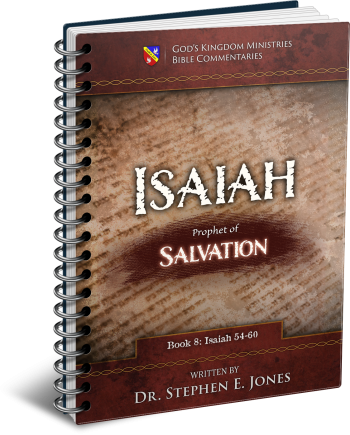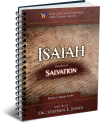Latest Posts
View the latest posts in an easy-to-read list format, with filtering options.

Isaiah is the prophet of Salvation. He is also known as the truly "Universalist" prophet, by which is meant that He makes it clear that salvation is extended equally to all nations and not just to Israel. He lived to see the fall of Israel and the deportation of the Israelites to Assyria, and he prophesied of their "return" to God (through repentance). He is truly a "major prophet" whose prophecies greatly influenced the Apostle Paul in the New Testament.
Category - Bible Commentaries

Isaiah 54:11, 12 says,
11 “O afflicted one [aniy, “poor, humble, afflicted”], storm-tossed [sa’ar, “to be driven by storm”], and not comforted, behold, I will set your stones in antimony [puwk, “dye, paint, eyeliner”], and your foundations I will lay in sapphires [sapper]. 12 Moreover, I will make your battlements [shemesh, “the sun, sunrise, east, glittering shields or battlements”] of rubies [kadkobe], and your gates of crystal [ekdakh], and your entire wall of precious stones.”
The prophet was referring to Sarah and her children, whose children were to outnumber the fleshly children of Hagar in the restoration of all things. But meanwhile, at the present time, the prophet describes these children as “afflicted” and “storm tossed” prior to the coming of the Comforter. These are metaphors for tribulation during the long exile and captivity.
Jesus said in Matt. 5:3,
3 Blessed are the poor in spirit [humble], for theirs is the kingdom of heaven.
When the disciples were “storm-tossed” while crossing the Sea of Galilee, they represented the Church in tribulation. Jesus came in the midst of the storm, created peace, and took them to Capernaum (John 6:17, 24), which means “Covering of the Comforter.”
As we have seen in our studies in John, this was a prophetic story about the time between His ascension to heaven and His second coming. The righteous ones, the Sarah company, were to experience adversity and trials for 2,000 years and then be “comforted” by His coming in the midst of the feast of Tabernacles (John 7:14).
The prophet then sets forth the promise of God in terms of building His new temple with metaphorical stones—the “living stones” mentioned in 1 Peter 2:5. These stones are not literal, but they represent certain truths which the prophet then explains in the next verses.
First, God says, “I will set your stones in antimony.” The Hebrew word is puwk, which was dye or paint. It was sticky enough to be used as cement. Women also used it as a cosmetic to line their eyes, as we see in the book of Enoch 8:1,
1 And Azazel taught men to make swords, and knives, and shields, and breastplates, and made known to them the metals of the earth and the art of working them, and bracelets, and ornaments, and the use of antimony, and the beautifying of the eyelids, and all kinds of costly stones, and all colouring tinctures.
Antimony was used as makeup for women’s eyes to make them more attractive. In a way one could say that its purpose was to cement or unify men and women in their marriage (Gen. 2:24). In that way, antimony represented peace and unity (or reconciliation).
The spiritual meaning of antimony is given in Isaiah 54:13,
13 “All your sons will be taught of the Lord, and the well-being of your sons will be great.”
The implication is that the sons of God will be cemented together in unity by the word of God, for they will all “be taught of the Lord.” Likewise, the eyes of their understanding will be opened (highlighted with puwk, so to speak). There will be no more disputes or debates.
Some time ago, a wall was discovered underwater with stones which, thousands of years ago, were bound together by antimony. The elements in the ocean only made the bond stronger. The atomic number for antimony is 51, which is the biblical number for peace or divine revelation. (See Secrets of Time, Appendix E.)
This is again reflected in Enoch 16:2-4, which says,
2 And now as to the Watchers who have sent thee to intercede for them, who had been [aforetime] in heaven, (say 3 to them): “You have been in heaven, but [all] the mysteries had not yet been revealed to you, and you knew worthless ones, and these in the hardness of your hearts you have made known to the women, and through these mysteries women and men work much evil on earth.” 4 Say to them therefore: ‘You have no peace’.”
In other words, the men and women ought to have worked together in unity to bring righteousness to the earth; but because they worked evil on the earth, “the mysteries” (secrets, revelation of God) had been withheld from them and they had “no peace.” It is interesting that the spiritual meaning of the number 51 is reflected in this ancient writing.
As we will see shortly in Isaiah 56, the prophet Isaiah did indeed have the revelation of unity and peace, which in turn was to be reflected in the writings of the apostles in the New Testament.
God says also, “your foundations I will lay in sapphires.” Its spiritual meaning is given next in Isaiah 54:14,
14 “In righteousness you will be established…”
Sapphire was seen prophetically as the stone pavement of the throne of God, by which justice is dispensed in righteousness. Exodus 24:9, 10 says,
9 Then Moses went up with Aaron, Nadab and Abihu, and seventy of the elders of Israel, 10 and they saw the God of Israel; and under His feet there appeared to be a pavement of sapphire, as clear as the sky itself.
Ezekiel 10:1 adds,
1 Then I looked, and behold, in the expanse that was over the heads of the cherubim something like a sapphire stone, in appearance resembling a throne, appeared above them.
Isaiah interprets the sapphire as God’s “righteousness” that is established when His throne is the foundation of the Kingdom in which the sons of God rule with Christ.
Again, God says, “I will make your battlements of rubies.” Its spiritual meaning is given in Isaiah 54:14, 15,
14 … You will be far from oppression, for you will not fear; and from terror, for it will not come near you. 15 If anyone fiercely assails you, it will not be from Me. Whoever assails you will fall because of you.
These spiritual rubies are described again in Psalm 46:1, 2,
1 God is our refuge and strength, a very present help in trouble. 2 Therefore, we will not fear…
The “battlements” of God are our refuge. The Hebrew word is shemesh, which literally refers to the sun in its rising. It is “the Sun of righteousness” in Mal. 4:2, the dawn of the Kingdom as the truth enlightens the world to bring healing in every way. It also refers to transfiguration, for Matt. 17:1, 2 says,
1 Six days later Jesus took with Him Peter and James and John his brother; and led them up on a high mountain by themselves. 2 And He was transfigured before them, and His face shone like the sun, and His garments became as white as light.
Paul tells us in 1 Cor. 15:51, 52,
51 Behold, I tell you a mystery [secret]; we will not all sleep, but we will all be changed 52 in a moment [atomos, “the atoms”], in the twinkling of an eye…
He describes that change in the context of Moses, whose face was transfigured after coming off the Mount. At that time, the people could not bear to look at the glory in his face, so he had to put on an Old Covenant veil to hide the glory.
We, however, have removed that veil, if we are truly under the New Covenant, so that we may see His glory and, like Moses, receive His glory in our face.
So we read in 2 Cor. 3:7 and 18,
7 But if the ministry of death, in letters engraved on stones, came with glory, so that the sons of Israel could not look intently at the face of Moses because of the glory of his face… 18 But we all, with unveiled face, beholding as in a mirror the glory of the Lord, are being transformed into the same image from glory to glory…
This is the shemesh of God that is our refuge and strength. Transfigured people have no fear, for the light of God protects them. Unlike the Israelites in Moses’ day, we are not afraid to behold His glory, for all fear is removed by our faith in the New Covenant promise of God. This courage is the spiritual ruby that forms our “battlement” that reflects the light and glory of the rising sun.
The prophet describes these “battlements” as having “gates of crystal.” These gates are part of the battlements, and so there is no distinct spiritual meaning attached to it. Yet we know from Revelation 21, which is John’s description of the New Jerusalem, that the city is surrounded by a wall. In those days virtually every wall had battlements with gates. Isaiah simply describes them as “crystal,” which comes from the Hebrew word ekdakh, “fiery glow, sparkling.”
On the gates were written “the names of the twelve tribes of the sons of Israel” (Rev. 21:12). When these names are translated in the order given in Rev. 7:5-8, they convey a message:
“Praise Confession: Behold, a Son a whole troop whose fortune has come. They are happy and blessed after wrestling and striving, forgetting their past troubles, hearing and obeying, united as one. Their recompense for their labor is to dwell with God, and He will increase and add to them many sons of His right hand.”
(See The Revelation, Book 3, chapter 9, pages 53, 54.)
The crystal gates, then, convey a message that was borne in the twelve sons of Israel listed in Rev. 7:5-8. It proclaims the story of the sons of God from their “past troubles” to the fulfillment of their destiny. This is their hope (expectation), an unstoppable destiny, for it is based on the promise of God and not on the promises of men. Hence, all fear of falling short is removed.
Isaiah 54:16, 17 concludes,
16 “Behold, I Myself have created the smith who blows the fire of coals and brings out a weapon for its work; and I have created the destroyer to ruin. 17 No weapon that is formed against you will prosper; and every tongue that accuses you in judgment you will condemn. This is the heritage of the servants of the Lord, and their vindication is from Me,” declares the Lord.
Hence, in addition to an understanding of the word that unifies the sons of God, along with justice and righteousness, humility and courage, God forges spiritual weapons that will overcome the world. God did not create the destroyer to be victorious but created him “to ruin,” that is, to be ruined, or to be overcome. Ruin is his destiny, because the sons of God are vindicated and justified by the divine court.
The sons of God, having their Advocate (“Comforter”) to assist them, always know how to be victorious in any dispute in the divine court. Hence, they will always know how to “condemn” their accusers in a lawful way. This is their heritage, both now and in the ages to come.